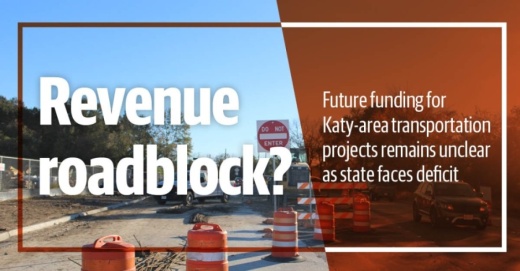Due to oil and gas and sales tax revenue plummeting, state legislators will be facing an estimated $4.58 billion budget shortfall when they convene for the 87th Texas legislative session Jan. 12.
State officials said it is unclear how transportation projects across the state, which are already squeezed for revenue, will be funded in the next few years.
“The pandemic has really hurt all of the primary sources for transportation revenue,” said Aaron Cox, vice president of the advocacy group Texas Association of Business. “It was really kind of a double-barrel assault.”
On the other hand, Fort Bend County voters passed a $218.2 million mobility bond during the Nov. 3 election to fund future transportation projects, and projects funded by the city of Katy have continued to progress.
While Katy City Administrator Byron Hebert said ongoing city transportation projects have the necessary funding to be completed on time, the city is expecting revenue shortfall projections from the Texas Comptroller’s Office to affect future transportation projects.
A historic drop
Despite recent efforts by voters and lawmakers to improve transportation funding, funding for Texas roads has not kept up with demand, Cox said, and this has been exacerbated by the pandemic.“Before COVID, ... infrastructure development wasn’t keeping pace with our state’s population and economic growth,” he said. “Our roads and bridges need constant improvement and maintenance. It’s an ongoing issue.”
Texas voters approved a pair of statewide propositions—Proposition 1 in 2014 and Proposition 7 in 2015—that diverted portions of revenue from oil and gas severance taxes, general sales taxes and motor vehicle sales taxes to the State Highway Fund, which is TxDOT’s primary source of funding.
However, the SHF is projected to see its state share of revenue fall by 20.44% and its federal income reduced by more than 12% from fiscal year 2020-21, good for an overall 17.11% drop in fund revenue in that time, according to the comptroller's office.
Texas State Comptroller Glenn Hegar told state officials July 20 to expect a historic drop in state revenue by the end of FY 2020-21, with motor vehicle sales tax revenue and severance tax revenue among the hardest-hit. The highway fund is projected to receive about $1.1 billion in FY 2020-21 based on collections from FY 2019-20, but in FY 2021-22, which will be based on collections from FY 2020-21, funding is projected to fall to $620 million, Hegar said.
Local projects
Although the pandemic’s effects on statewide transportation funding may not be clear until the Legislature’s spring 2021 session or later, road projects in Fort Bend County and across the state remain on schedule. Some have even accelerated.Lower traffic due to stay-at-home orders helped crews work faster, said Andrea French, executive director of Transportation Advocacy Group Houston.
“You’ll see projects where they weren’t supposed to be completed for a year; their timeline has been moved up six months,” she said.
Fort Bend County Judge KP George said that as one of the fastest-growing communities in the country, the county must work with state and local stakeholders to plan and fund transportation projects for the next several years.
“I encourage our legislators to utilize all tools at their disposal including those for economic stabilization to lessen the impact of these major cuts that will hurt the state of transportation in our state,” George said in an email.
In November, 75% of Fort Bend County voters approved a $218.2 million mobility bond, which will help support 59 total mobility projects, including several in the Katy and Fulshear areas.
Precinct 3 Commissioner Andy Meyers voted in favor of the county calling the 2020 bond election, and County Auditor Ed Sturdivant said each commissioner had the opportunity to review and provide revisions to the mobility bond projects.
Assistant County Engineer Ike Akinwande said county officials and commissioners are supportive of spending the recently approved bond funds.
“In consideration of the financial climate, the county remains committed to increase the capacity of the Fort Bend County roadway network, improving intersections, building sidewalks and enhancing safety to create new connections within and among neighborhoods,” Akinwande said in an email.
George said county officials will aim to protect taxpayers' money while prioritizing the needs of the county.
“The successful bond project will also be leveraged to pull in the maximum amount of local, state, and federal dollars and to collaborate with partners to ensure we maximize the usage of each dollar," George said in an email.
While the pandemic has been challenging, Hebert said, the city will continue to strategically plan its future capital improvement projects. Through development, the city is trying to create a north-south corridor to help alleviate congestion on city roads, he said.
Katy largely funds road projects using a portion of its sales tax revenue, which initially goes to the Metropolitan Transit Authority of Harris County.
METRO refunds some of these dollars back to the city to be used for local mobility projects. Throughout the coronavirus pandemic, sales tax revenue for the city of Katy have varied, from being down by 17% to being up by more than 31% in a given month, but year-over-year numbers have remained fairly steady.
“Fortunately for the city, our METRO funding for road projects has not changed,” Hebert said in an email.
Looking for revenue
Representatives from transportation advocacy groups said they are pushing for long-term solutions to address the funding gridlock on Texas roads.Transportation Advocacy Group Houston is advocating for several options for new revenue sources, French said. One is to collect a fee from users of alternatively fueled vehicles. The other is to lift the 8.25% cap on sales tax so cities and counties would have the flexibility to raise it.
The third—to either raise or at least to index the gas tax rate for inflation—is an idea that has historically been met with pushback, French said.
“There was a time when even more conservative leaders supported it, but now, the word ‘tax’ has become such a dirty word to use; it gets swept up in those conversations,” French said.
Although TxDOT Director of Media Relations Veronica Beyer said in an email that the department will assess any revenue impact fully and adjust future plans accordingly, local transportation groups said future projects that involve state funding could be affected in the next two to three years.
“How significant they will be—I don’t think anyone quite has a handle on that yet,” said Allie Isbell, transportation manager for the Houston-Galveston Area Council, which secures federal and state funding for local projects. “But there will be a dent.”
Additional reporting by Shawn Arrajj, Andrew Christman, Andy Li, Anna Lotz, Ben Thompson, Nola Valente and Eva Vigh





